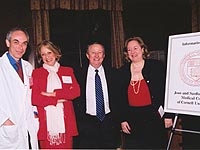
At the May 21 "Information Please" breakfast: (from left) Dr. H. Dirk Sostman, chairman of radiology; hostess Daisy Soros; Dr. Antonio Gotto, dean of the Medical College; and Dr. Claudia Henschke, director of the Division of Chest Imaging in the Department of Radiology.
Weill Cornell Overseer Daisy Soros was hostess to 45 guests at an "Information Please" breakfast held on May 21 that focused on the theme "Scanning the Future: Advances in Imaging Technology." Dr. Antonio Gotto, dean of the Medical College, opened the presentation, saying, "Imaging plays an important role in what we do here at Weill Cornell and what we plan to do in the future."
Dr. H. Dirk Sostman, professor and chairman of radiology (and also senior associate dean for clinical affairs), provided an overview of technologies that screen internal organs such as the chest, lung, heart, coronary arteries and the brain. He defined screening as very useful in detecting pre-clinical disease, with the purpose of preventing or delaying that disease in a healthy patient. Weighing in on current debates surrounding some of the newest procedures, such as the full body scan, Dr. Sostman pointed out that while research has not yet determined the best candidates for certain new screening procedures, there is great potential in these tests, especially as the technology advances.
Dr. Claudia Henschke, professor of radiology and director of the Division of Chest Imaging, discussed her research on lung cancer, which is diagnosed in 171,000 new cases a year in the U.S. Dr. Henschke made a powerful argument for the benefits of early detection of lung cancer made possible through advanced radiological screening.
Dr. Henschke also addressed the recent debate over the value of mammograms and explained her view that recent reports questioning the usefulness of the procedure may have been based on inaccurate analysis of certain research. Dr. Sostman agreed, saying that most radiologists and physicians at Weill Cornell strongly believe that the test is beneficial.
Following the presentations, guests participated in a lively question-and-answer session. Information Please is a series of breakfast meetings that focus on new programs and research at Weill Cornell Medical College. For more information, please contact Diane Schoenthal at (212) 821-0507 or e-mail dis2001@med.cornell.edu.

